Kicking off the second day of this year's Devcom was Blizzard Entertainment's Saralyn Smith who took to the stage to explain the games giant's approach to making the most of its massive community.
The senior director for global community broke the Overwatch giant's process into three Fs - Focus, Feedback and Fellowship.
Focus, Smith says, is "simple, but not easy", explaining that it's important to pay attention to the community at large and the trending conversation. This needs to be a part of every single meeting at the company - not just the community and PR team.
Additionally, Smith explained that every single voice matters and that Blizzard is always looking for insight from, well, anywhere. One example she cited was the hiring of an "outspoken guild leader" from the EverQuest community. That person was Jeff Kaplan, who now directs Overwatch.
"Every voice matters - we aspire to live by this," Smith said.
"Our culture is one where every voice might contribute something. We iterate, we listen, we improve."
Part of this is getting feedback from the community to help the game - this can be something as simple as having a survey after demos or on-stage Q&As with developers at its Blizzcon event.
Additionally, it's important to keep an eye on what is going on in the community. Smith said that one kid went to Blizzcon and had a T-shirt signed by the Hearthstone team. They went home and their grandmother washed the top, wiping out the signatures.
Blizzard's second F is feedback - the idea that you need to listen to the community and get a feedback loop going to know their thoughts. The big, early step that needs to be taken here is establishing communication methods. This is something that Blizzard has been experimenting with for years now, with everything from livestreams to answer questions from the community or videos such a Jeff Kaplan's Overwatch updates. These get millions of views, so the games firm obviously is onto something!
Additionally, to manage the StarCraft community, Blizzard releases a weekly forum post that questions and complaints from the audience in order to address their concerns. Smith says that this reliable cadence is "very popular and appreciated."
Having an open conversation on Twitter is also important, with developers often replying to concerns from the community on their own accounts. Even if replying from a game account, Smith says it's important to provide a human response to questions and not avoid the difficult concerns.
This feedback loop was also vital in the creation of Classic World of Warcraft - the fans were demanding for a 14 year-old version of the game. This was something a small portion of the development team wanted, but because the community wanted it, they got it.
This doesn't always pay off, however. Smith points to Brooklyn Nine Nine star Terry Crews making references to voicing new character Doomfist in Overwatch. The community was demanding this - as was Dwayne 'The Rock' Johnson - but this didn't line up with Blizzard's development schedule.
The final F is Fellowship - the pay off for all the work that Blizzard does with the community.
This is about the work that comes from the community, be that memes or fan art. For example, the Overwatch team introduced a new emote based on fan art of in-game character DVA being a Mountain Dew swilling, Dorito munching nerd.
Blizzard has also been turning to the community to build hype for their games - including collaborating with influencers, journalists and pro-players to reveal new cards in Hearthstone.
It's also important to support not just the biggest personalities but also those up and coming. A few years ago, Blizzard spotlighted streamer Alliestrasza, who at the time had in the region of 70 followers on Twitch. She was featured on Battle.net and now has 100,000 followers and around 3.6m views.
"You should also keep your eye out for that up and coming talent and invest in them," Smith said.
There is, of course, a commercial upside to all this work to engage the community. Smith cited research from Fandom showing that invested gamers spend 230 per cent more than their casual counterparts.
"It makes sense to keep your community engaged and happy," Smith said, saying that these core players speak up more often, are more influential and are more receptive to marketing.
"We don't always make community happy but aspire to," Smith concluded.
"Embrace the great fandom frontier - at Blizzard, we believe that game building is community build and community building makes our world a better place."



